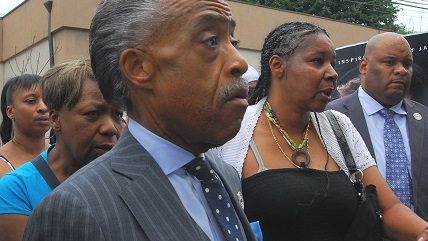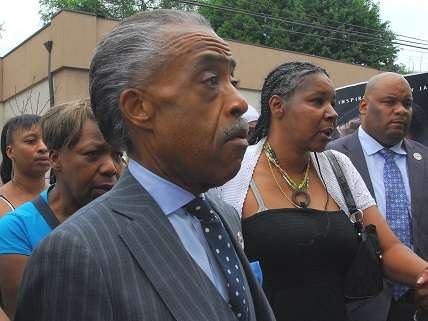What About 'Black-on-Black' Crime?
Raising "black-on-black crime" right now is not a sincere attempt to improve the lot of African-Americans.


The shooting of Michael Brown and its turbulent aftermath have renewed an old question: Why does the black community raise a ruckus when a white person kills a black person, which is rare, but not when a black person kills a black person, which is far less rare?
It's a complaint perennially lodged by conservative commentators. Jason Riley, an African-American editorial writer for The Wall Street Journal, criticized the Rev. Al Sharpton's appearance in Ferguson, Missouri. "The problem is not cops shooting blacks but blacks shooting each other," he asserted. Yet "so-called black leaders are much more interested in making excuses for this behavior than they are in denouncing it unequivocally."
"What about black-on-black violence?" demanded Fox News anchor Martha MacCallum, who is white. "Where is Al Sharpton on that? Where is the president on that?"
Funny you should ask. Sharpton made a publicized trip to Chicago in November to focus attention on the city's chronic violence. Last year, Michelle Obama attended the funeral of Hadiya Pendleton, a 15-year-old black honor student who was shot, allegedly by a black gang member.
The first lady later returned to Chicago to converse with students at a school that is nearly 100 percent African-American. "In choosing Harper High School for the visit, the White House noted that 29 current or former students there had been shot in the last year, eight of them fatally," reported the Chicago Tribune.
The president also traveled to Chicago, meeting with kids involved in a mentoring program for at-risk adolescent boys, bemoaning gun violence and telling a crowd on the South Side, "Our streets will only be as safe as our schools are strong and our families are sound."
Doesn't sound like they've been ignoring or excusing this sort of violence. Plenty of black leaders and organizations in Chicago and elsewhere spend a lot of time and energy trying to prevent crime in their communities. There are rallies, conferences, prayer vigils and gun turn-in days. Last year, thousands of volunteers manned "Safe Passage" routes to get children to school unharmed.
Have Riley and MacCallum and other critics publicized those events and programs? If not, why not? If so, why do they now act as though they don't exist?
Their charges have more than a whiff of condescension—implying that most blacks are unable to discern the greatest ills afflicting them. But black leaders can walk and chew gum at the same time. They can work to curb violence by blacks against blacks and also work to prevent the killing of unarmed African-Americans by police and vigilantes. Both are deeply undesirable.
It's no secret that rates of violent crime are far higher among blacks than among whites. What is generally overlooked is that these rates have dropped sharply over the past two decades. The Center on Juvenile and Criminal Justice reports that violent crime by young blacks has plunged 60 percent.
In 1995, the FBI reports, 9,074 blacks were arrested for homicide. In 2012, the number was 4,203—a decline of 54 percent. But conservatives don't labor endlessly to publicize that trend.
Nor do they often mention what USA Today reports: "Nearly two times a week in the United States, a white police officer killed a black person during a seven-year period ending in 2012, according to the most recent accounts of justifiable homicide reported to the FBI."
There's another, bigger problem with the preoccupation with "black-on-black crime." The term suggests race is the only important factor. Most crimes are committed by males, but we don't refer to "male-on-male crime." Whites in the South are substantially more prone to homicide than those in New England, but no one laments "Southerner-on-Southerner crime." Why does crime involving people of African descent deserve its own special category?
The phrase stems from a desire to excuse whites from any role in changing the conditions that breed disorder and delinquency in poor black areas. It carries the message that blacks are to blame for the crime that afflicts them—and that only they can eliminate it. Whites are spared any responsibility in the cause or the cure.
Excluding them from complicity is harder to do when the killer is white and the killed is black, as in the shooting in Ferguson. Raising "black-on-black crime" right now is not a sincere attempt to improve the lot of African-Americans. It's a way to change the subject and a way to blame them.


Show Comments (178)